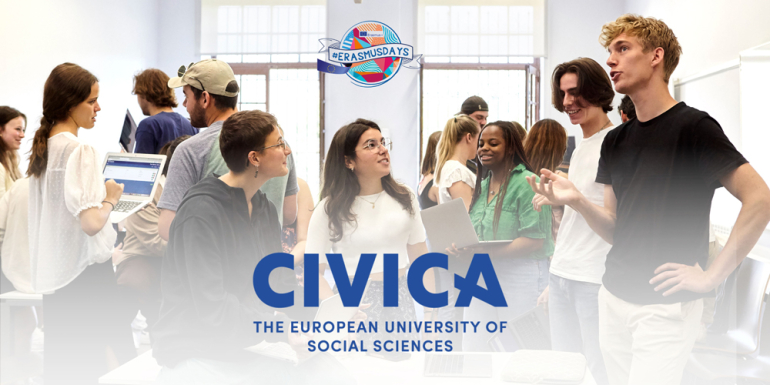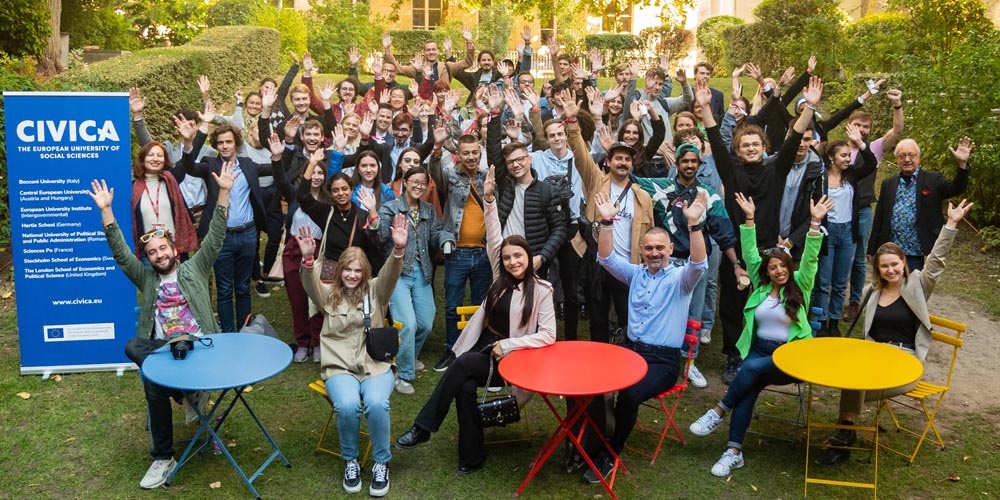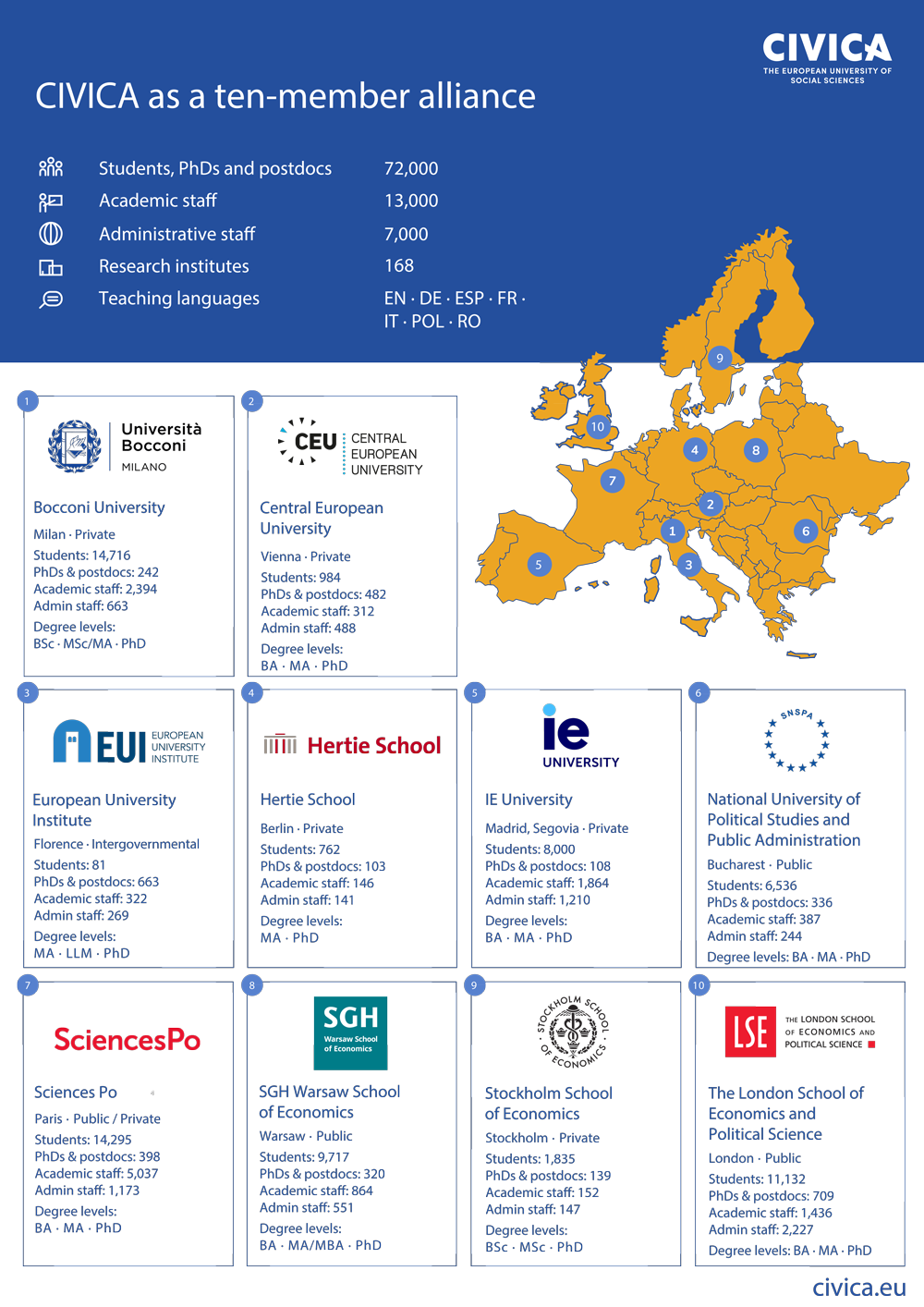
This month, on the occasion of Erasmus+ days, the university alliance CIVICA celebrates its three-year anniversary with the launch of the new phase and the official onboarding of its two new members: IE University (Spain) and SGH Warsaw School of Economics (Poland).

After the successful result of the 2022 Erasmus+ European Universities Initiative call, CIVICA has officially started implementing its joint long-term strategy of building a sustainable European University over the next four years. The ten-member alliance is ready to leverage the knowledge and expertise gained from the pilot stage and prepare for the next funding period with an expanded network, new projects and an ambitious plan of actions for the future.
“CIVICA is uniquely placed to address current and emerging challenges” – shared Vanessa Scherrer, Vice President for International Affairs at Sciences Po and Coordinator of CIVICA. “The ten partner institutions have come together with the ambition to assume civic responsibility for current and future European generations, to strengthen the role of Europe in the world, and raise the profile of European social sciences in education and research.”
Two new members onboard: IE University and SGH Warsaw School of Economics
With the new composition of the alliance, CIVICA achieves a wider geographical and transdisciplinary balance and reflects the diversity of higher education across the continent. The profiles of IE University and SGH Warsaw School of Economics, respectively from Southern and Central Europe, closely align with the one shared by the existing CIVICA members in terms of expertise, core values, and university culture, while bringing complementary strengths to the table.
IE University will have a key role in the establishment and development of global outreach and partnerships for the alliance.
For Manuel Muñiz, IE University Provost and Dean of IE School of Global and Public Affairs, “Universities can play an important role in finding solutions to the challenge of climate change, in educating for the jobs of the future, and in building innovation and transfer ecosystems that can, in turn, foster sustainable growth. CIVICA will enhance the work that our ten institutions are doing individually on all these fronts, enabling us to fulfil our mission in a more impactful way".
SGH is among the seven Polish universities to become part of the already existing European University alliances.
“I am overjoyed that SGH is one of the first Polish universities to engage in creating a common area of higher education in the European Union'' shared prof. Piotr Wachowiak, Rector of SGH Warsaw School of Economics. As a leading institution responsible for “student community and identity” within the alliance, prof. Wachowiak addresses directly its academic community saying “Together with our partners in CIVICA, we have a very well-prepared plan of actions for the next four years. (…) I strongly encourage scholars, young researchers, students and doctoral candidates to join this marvellous project as it will serve to build a strong academic position of the SGH Warsaw School of Economics in Poland, in Europe and in the world.”
Concrete steps to set the next phase in motion
CIVICA builds on the achievements made during the pilot phase of the European Universities Initiative to set the next steps of the work plan proposed and successfully reviewed by the European Commission.
This week CIVICA celebrates the third anniversary of the alliance. “Three years full of great achievements for CIVICA which offers unprecedented opportunities to our communities” – comments Cornelia Woll, President of the Hertie School, one of the eight founding members and leading institution for “dissemination and impact” within the alliance. “During the pilot phase, CIVICA members have built a strong basis for a successful collaboration. With the new evolutions ahead, together, at each member university, we will ensure that CIVICA will become more and more part of students’, faculties’ and staff’s everyday lives.”
“The priority is to make CIVICA a reality for students, (post)doctoral researchers and faculty” said Aurélien Krejbich, Executive Director of CIVICA. “We believe that this new chapter will be pivotal in the building of the European University of the future and to establish CIVICA as a leading actor in the social sciences.”

Among the many goals for the second phase, CIVICA will enrich its academic offer and expand mobility opportunities notably for faculty and postdoctoral researchers, while further developing the European Digital Campus. The links between member university libraries will be strengthened, student projects across the alliance will be encouraged and supported, and the joint research environment will be reinforced through dedicated calls for research proposals.
Following the renewed mission statement, jointly agreed by all ten member institutions, the alliance will foster advancements in education, research and innovation, and service to society. These are the main pillars of CIVICA. All four of them are closely interlinked and interdependent and provide a solid foundation for a sustainable, transnational and research-intensive European University in the social sciences and humanities.
Read the renewed mission statement>>
About CIVICA and its two new members
CIVICA www.civica.eu brings together ten leading European higher education institutions in the social sciences, humanities, business management and public policy, with a total of 72,000 students and 13,000 faculty members. Together, they build on an ever-stronger combination of teaching, research and innovation to mobilise and share knowledge as a public good and to facilitate civic responsibility in Europe and beyond.
IVICA’s members are:
- Bocconi University (Italy) - unibocconi.eu
- Central European University (Austria and Hungary) - ceu.edu
- European University Institute (Intergovernmental) - eui.eu
- Hertie School (Germany) - hertie-school.org
- IE University (Spain) - ie.edu
- National University of Political Studies and Public Administration (Romania) - snspa.ro
- Sciences Po (France) - sciencespo.fr
- SGH Warsaw School of Economics (Poland) - sgh.waw.pl
- Stockholm School of Economics (Sweden) - hhs.se
- The London School of Economics and Political Sciences (United Kingdom) - lse.ac.uk
With a unique focus on the humanities field, IE University offers a technology-based learning ecosystem for leaders who make a difference in the world through innovation, global vision, entrepreneurship and sustainability. IE University comprises five schools: IE Business School, IE School of Science and Technology, IE Law School, IE School of Architecture and Design and IE School of Global and Public Affairs, which offer undergraduate, graduate, executive education and doctoral programmes. This year, the institution hosts more than 8,000 students from 140 countries at its Madrid and Segovia campuses, and the institution’s network of 72,000 alumni is present in 165 countries.
Founded in 1906, SGH Warsaw School of Economics is Poland’s oldest and leading university of economics. It combines years of experience with the latest global trends in education. Its most valuable asset is the people, who create a unique academic community. SGH offers first and second-cycle studies, as well as doctoral and postgraduate programmes. Its approach to education is to convey not only knowledge but also practical skills, which allow graduates to successfully face the challenges of a rapidly changing social and economic reality. SGH conducts research in the fields of social sciences, mainly in economics, finance, management, as well as sociology and public policy sciences.
Press contacts
- Alessia Manco, CIVICA Communications Manager, a.manco@hertie-school.org
- Rosa Aranda Barrio, Associate Director of Communications, IE University, rosa.aranda@ie.edu
- Maria Karas, Deputy Director at Rector’s Office: mkaras1@sgh.waw.pl | Mariusz Sielski, SGH Spokesman: rzecznik@sgh.waw.pl
More about CIVICA
Interested in receiving the latest CIVICA news and opportunities?
Subscribe to our newsletter>>




